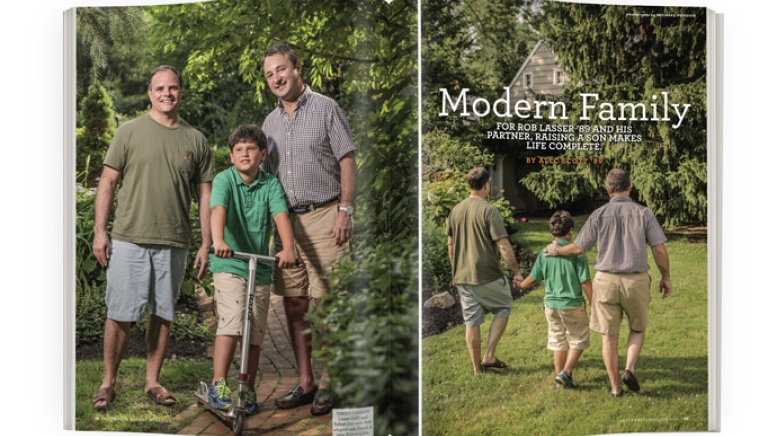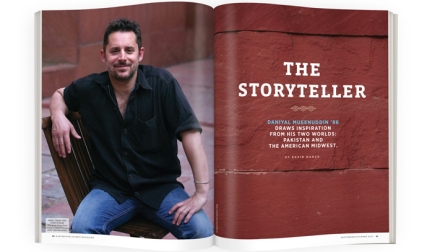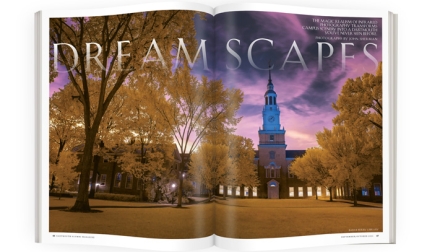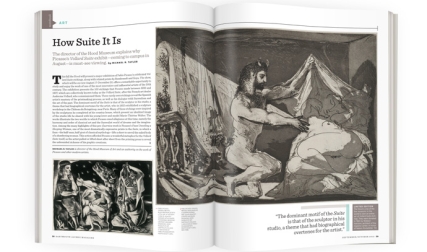Many of the fences have American flags on them, and some of the barns in rustic, posh Buck’s County, north of Philadelphia, are festooned with red, white and blue bunting. It’s a sunny morning a couple of days after the Fourth of July, and the radio DJ is sending out classic rock from what he calls the Cradle of Liberty: “Did you write the book of love, and do you have faith in God above?”
The brick-and-clapboard house also looks quintessentially American, though technically its oldest section is English, built in the late 1730s. George Washington’s hungry troops are supposed to have devoured bread baked in a stone oven on the side porch. Inside are antique armoires, highboys and dressers in the correct places, period-appropriate paint colors, blue-and-white china up on the plate-rail. Also, in an otherwise formal parlor, a child’s shiny drum set.
The drum set isn’t the only modern note. In fact, one might say this old house is again witnessing something revolutionary. Rob Lasser lives here with his partner, Bernie Tellner, and their son David, the drummer, now 8.
Tellner and David are out at a soccer practice. One gay guy to another, I admire Lasser’s blue-and-white china. “Oh those,” Lasser says with an eye-roll. “We bought them on eBay.” I remember this nice, anti-pretentious wryness from a couple of brief meetings at the College. Although our paths seldom crossed when we were students, we had friends in common.
Lasser would never put it this way, but he was a brave undergrad, or looked that way from a distance. He came out early, his sophomore year, in the fairly homophobic environment that was Dartmouth then. In his senior year he co-led the gay and lesbian group that had the 1980s fad color DaGLO for an acronym. “When I saw Brokeback Mountain it rang a big bell,” he says. “I realized that was what it was like for me, for us there. Lots of suspicion. If you did things, if you met someone, you kept quiet about it. Dartmouth was otherwise a good place to be, away from the worries that most people have, but, still, there was a lot of fear.”
Only a couple years before we arrived on campus a female Dartmouth Review reporter had attended and secretly taped a meeting of the campus support group, pretending to be lesbian or at least questioning. The Review wrote about the group, outing members.
And there was, of course, AIDS, that poorly understood, life-threatening ailment, bringing major risk into almost every tentative sexual exploration. “If I’d been born five, 10 years earlier I’d probably be dead,” Lasser says matter-of-factly. We knew about safer sex, to be sure, but no treatment had yet been discovered.
Same-sex marriage? That was fantasyland, never to occur in our lifetimes. Having children was probably something you gave up by being gay. Adoption seemed unlikely and surrogacy not only a hassle but also politically retrograde. Some of us made pacts with female friends that if neither of us were hooked up by the far-off age of 35, then….
Lasser somehow came through those days with enough resolve left in him to decide to rework the script set out for gay guys—at least eventually. “It’s funny,” he says. “I never even went through ‘I’m gay, I can’t have a kid.’ It never entered my mind. It was more about all the fun I get to have after coming out.”
After Tellner and David return from soccer on the July day I am visiting, the four of us repair to the back yard, where there’s plenty to do—bouncing with the boy on his trampoline, playing monkey-in-the-middle in their pool. “I have lots of pool toys,” David says proudly, as he squishes a bug crawling next to the water. “He’s all boy,” Lasser says with a laugh.
The dads face many of the same challenges that many straight parents do: How much videogame time should they allow (minimal); how is he enjoying the Quaker-run school he attends (very much); will he take to soccer (jury’s out)?
David is an easygoing boy, and a perceptive one whose gaze conveys intense scrutiny. “He can read a room of adults,” Tellner says. To David, Tellner is “Daddy,” Lasser is “Dad.” Those around the family instinctively differentiate in the same way: “What does Dad think? Should I call Daddy?”
When a stranger runs into one of the fathers on his own with David and asks about the absent mother or wife, each father offers the stock reply, “Actually, we’re a two-dad family.”
“Sometimes it takes them a moment or two,” Tellner says. “But they usually get there.”
The couple first discussed adoption in 2004, retreating to Provincetown, Massachusetts, where both had partied as footloose guys in their 20s, to talk about adding a child to their household.
They had been a couple since 2001, after meeting in the emotional wake of 9/11. Lasser had completed medical school at Boston University and an M.B.A. at the Wharton School. An expert on anti-depressants and author of widely published clinical research, he was working, as he does now, in the pharmaceutical industry. Tellner was working in human resources. “We met when I was 32,” Lasser says. “After a few years we asked the question, ‘Okay, we’re 36 now. Are we just going to settle down and collect antiques?’ ”
Instead they decided they’d adopt rather than retain a surrogate, becoming part of the first generation of openly gay fathers to raise children together not by happenstance or after divorce or the death of a wife but by design. “When you have an excess of resources and love, and the opportunity to be able to give that in a lasting way to others, you should do it,” says Lasser. Tellner would leave work to become a stay-at-home father. “He came from a big, Catholic family and was a great, much-loved uncle. Everyone knew he’d make a great, hands-on dad,” says Lasser.
A private attorney they retained had a finder who located David’s birth mother two months into her pregnancy. They traveled to Texas to meet her and the birth father, then brought her back to Pennsylvania to deliver the baby. “The legal regime was more favorable to gay adoption in Pennsylvania,” Lasser explains.
From an ultrasound it looked like a girl was on the way, so Tellner stockpiled two years of girl’s clothes in the nursery, which they painted in gender-neutral colors—a fortuitous choice.
“We each had one of the mother’s legs at the birth, and when the baby came out I thought, ‘What is that between its legs?’ ” Lasser remembers, laughing at the memory. “This was even though I’m a doctor who’s delivered babies.” The nurse soon presented the obvious answer. The birth mother was worried the guys wouldn’t want him—“which was crazy,” Tellner says.
Although many states have birth certificates with spaces in which to list a mother’s and a father’s names, Tellner and Lasser appreciate that both their names appear on David’s, as Parent 1 and Parent 2. Before the birth parents left to go back to Texas, they insisted that the adoptive parents take a photo of them handing over David.
Every childhood has a sensory and moral backdrop. In an Italian-American one it might be bubbling spaghetti sauce, opera, Scorsese movies and Catholicism. Gay culture and the gay community’s free-to-be-you-and-me ethic provide some flavor to David’s upbringing.
Lasser and Tellner are out parents, not striving for a Cleaveresque normality. As a family they watch RuPaul’s Drag Race. Glee songs and disco classics provided the soundtrack to the day in the pool. The day after New York State legalized gay marriage, the three went into New York City, to the streets near the Stonewall Tavern, to mark the momentous occasion. “We woke up in good moods and we just wanted to be there, to take in the city’s energy,” Lasser says. Their circle is totally mixed, with friends in all manner of family arrangements. For a time Lasser blogged extensively on twodads.org about his and Tellner’s parenting experiences and about issues relevant to same-sex parents, but he’s lately become less active online. “Twitter can easily eat up your life,” he says.
Within their small family the couple divides typical household tasks. Tellner, the handy one of the pair, deprecates his abilities, but he’s the one helping to give their 270-year-old house the maintenance and periodic upgrades it needs. After Hurricane Sandy he was the one who headed out with a chainsaw. “I’m the administrator—and I do the laundry,” Lasser says. “Bernie’s more of the feeler of the two of us. If I plan a [kid’s] birthday party I might call in for pizza and that would be that. He’s going to make it special. That’s one of his talents.”
In August of last year the three of them went with Tellner’s recently widowed father to Family Week in Provincetown—it’s billed as the largest gathering of lesbian-, gay-, bisexual- and transgender-headed families in the nation. “For us it was a great week, but you realized you can’t go back in time,” Lasser says of the Cape Cod town with so much personal history. “As far as Family Week, David has that ho-hum attitude—two moms, two dads, big deal. He was more excited about getting his face painted like a zombie and scaring people.”
One day recently David asked Lasser, a secular Jew, and Tellner, a lapsed Catholic, what that made him in terms of religion. Although he had been baptized in the Episcopal Church—a compromise choice, Lasser says—neither father wants to impose a particular perspective on their son. “We told David, ‘We’ll give you information and take you to temple, church, mosque. You have friends who are Hindu, Jewish, Muslim and Christian. We’ll help you learn as much as you can, but it’s going to be your choice,’ ” says Lasser.
Sometimes the boy takes out the photo of his birth parents giving him to his two dads. “The photos have meant something to him, and will mean something more as he gets older,” Lasser says. “They explain his story.” Lasser also has a photo that he likes to look at: one of the dads, son, godparents and officiant on the day David was baptized. When Lasser was young, he says, he didn’t have a particular yen for kids—or an antipathy to them. In the photo he’s always surprised at what he sees. “I have never seen myself smile with such intensity,” he says. “The joy just comes through the printed photograph.”
Alec Scott is an award-winning freelance writer based in the Bay Area. His work has been published in the San Francisco Chronicle, San Francisco magazine and Toronto Life.
MODERN FAMILY TWO
The Surrogacy Option
For mother-of-one Lisa Baker ’89, carrying a baby for a gay couple was a gift she was eager to give. As told to Alec Scott.
A little more than a decade ago I gave birth to a baby girl for a gay couple to raise. They are her dads, the two parents listed on her birth certificate. One of them donated the sperm that fertilized my egg.
What I am to her is more complicated. She calls me Lisa.
For all the tough moments that were involved—and there were some—I have no regrets. The surrogacy is one of the best things I’ve ever done, one of the few times in my life when I departed from the usual script.
I came to the decision in stages. After Dartmouth I went to graduate school in Montreal. During my Ph.D. program my husband, Jerry, and I decided to have a baby. Eric, now 18, was and is beautiful, healthy, lively, original—a complete joy in my life. By the time Eric was 2 Jerry and I had decided that one child was the right number for our family.
Jerry had a cousin he was very close to who was not able to successfully sustain a pregnancy. In the most natural way I had the idea that I could carry the baby she wanted. I read up on surrogacy in a law library in Montreal. The feminist take was scathing: Surrogacy is an exploitation of lower-class women who have few economic options. I could see the political point of view—I’d read The Handmaid’s Tale—but I felt it had nothing to do with me. (I also happen to think it has little to do with the many generous, altruistic women who choose to be surrogates.)
As it turned out, when we made an offer of surrogacy, Jerry’s cousin and her husband were already on the way to adopting. That made sense to them.
Jerry and I moved back to the States, I found a job as a professor, we bought a house outside New York City and my son entered grade school. Maybe it was a sort of mid-life crisis, but I wondered, “Is this all there is?” I wanted to do something bigger, and the idea of bearing a child for someone who was unable to was a concept that had caught my imagination. I was lucky that my husband not only understood my motivation but also agreed I had a great gift to offer.
I started to think about people I had known who might need my help having a baby, and the gay guys I’d met at Dartmouth and after that came to mind. I placed an ad on a website that matches surrogates with potential parents. It was strikingly similar to a dating site. When a gay male couple in California contacted me, I immediately felt their warmth, maturity and desire to start a family.
I’ll never forget having dinner with one of the two at an Indian restaurant near my home. He was in New York on business. He was the more cautious of the pair, very conscious of all that could go wrong. I don’t think it was until he’d met me—and saw that I was a serious adult—that he started to believe surrogacy could bring him a family. He later told me that as he drove away from dinner he felt he had met his destiny.
We all consulted lawyers and talked over the risks. The dads agreed to pay me what is a moderate fee for a surrogate—$15,000—but the payment complicated things in anti-surrogacy New York. Jerry and I agreed to waive the fee. It was never about the money.
Inseminations in California resulted in a pregnancy—and a miscarriage back home. That was rough, but we all decided to try again. The dads sent frozen sperm to New York, and the next pregnancy succeeded.
I went out to legally friendly California for the birth. Seeing the baby in her dads’ arms was exactly what we all wanted—exactly what I had dreamed of—yet it was so hard, physically hard, for me to part with her. On the flight home I felt as if I’d left a part of my body behind. Later, alone in my home office, I cried as I never had before. I was ravenous for the fathers’ e-mails and phone calls, their progress reports and photos. After a few months, however, that feeling was gone. She was in the right place.
I visited the child a few times when she was little. She is bright, loving, like sunshine. She and her dads phone me on Mother’s Day and holidays. I buy her presents, as I do for my nieces and nephews. I love having her in my life—it’s like having more family.
On reflection, there was something activist about this choice I made. The surrogacy was about using my body—and my courage, my intelligence, my emotional balance—to create my ideal world. I believe people should grow up knowing that whatever their sexuality, they can love. They can form partnerships and families. That was my motivation. But there’s more to it, obviously. As she grows up, the beautiful girl I gave birth to will have to decide what this story means to her—the child always does. Did I do something altruistic, or was it in some way monstrous? My birth daughter will create her own story.
Although Jerry and I have since split up, I’ll always be grateful that we were able, both of us in different ways, to contribute to bringing this child into the world. Her fathers and their extended family, Jerry and I, our son, we all made it work. Despite all the obstacles, the legal problems, the physical and emotional rigors of the miscarriage and birth, our trepidation about doing something outside the ordinary, despite all of that, we made a beautiful thing here. Everything about it is good.
Lisa Baker is a medical writer at a publication planning agency in Southport, Connecticut. She lives in Stamford, Connecticut, with her partner and their young adult children.




